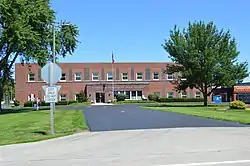Flanagan, Illinois
Flanagan is a village in Livingston County, Illinois, United States. The population was 1,110 at the 2010 census.[3]
Flanagan, Illinois | |
|---|---|
 Flanagan high school on Illinois Route 116 | |
 Location in Livingston County, Illinois | |
.svg.png.webp) Location of Illinois in the United States | |
| Coordinates: 40°52′39″N 88°51′32″W | |
| Country | United States |
| State | Illinois |
| County | Livingston |
| Township | Nebraska |
| Area | |
| • Total | 0.57 sq mi (1.48 km2) |
| • Land | 0.57 sq mi (1.48 km2) |
| • Water | 0.00 sq mi (0.00 km2) |
| Elevation | 670 ft (200 m) |
| Population (2010) | |
| • Total | 1,110 |
| • Estimate (2019)[2] | 1,064 |
| • Density | 1,860.14/sq mi (718.05/km2) |
| Time zone | UTC-6 (CST) |
| • Summer (DST) | UTC-5 (CDT) |
| ZIP code | 61740 |
| Area code(s) | 815 |
| FIPS code | 17-26311 |
| Wikimedia Commons | Flanagan, Illinois |
| Website | www |
Geography
Flanagan is located in western Livingston County at 40°52′39″N 88°51′32″W.[4] Illinois Route 116 passes along the southern edge of the village, leading east 12 miles (19 km) to Pontiac, the county seat, and west 10 miles (16 km) to Woodford.
According to the 2010 census, Flanagan has a total area of 0.53 square miles (1.37 km2), all land.[5] A small man-made lake (originally four separate lakes, some being filled in), called the Legion Lake, is located on the west side of the village. A walking trail surrounds it and a park shelter is located on the site. Artesian Park, another small park within the village boundaries, is located on the east side of town. It boasts two picnic shelters, a tennis court and playground equipment. A small business district of roughly one block in length is located in the center of town. Just north of this, the Flanagan Co-op can be found, a complex of several grain elevators and silos at Main and Lumber streets.
Demographics
| Historical population | |||
|---|---|---|---|
| Census | Pop. | %± | |
| 1890 | 384 | — | |
| 1900 | 509 | 32.6% | |
| 1910 | 590 | 15.9% | |
| 1920 | 637 | 8.0% | |
| 1930 | 631 | −0.9% | |
| 1940 | 663 | 5.1% | |
| 1950 | 672 | 1.4% | |
| 1960 | 841 | 25.1% | |
| 1970 | 976 | 16.1% | |
| 1980 | 978 | 0.2% | |
| 1990 | 987 | 0.9% | |
| 2000 | 1,083 | 9.7% | |
| 2010 | 1,110 | 2.5% | |
| 2019 (est.) | 1,064 | [2] | −4.1% |
| U.S. Decennial Census[6] | |||
As of the census[7] of 2010, there were 1,110 people, 446 occupied households, and 278 families residing in the village. The population density was 2,028.8 people per square mile (789.0/km2). There were 497 housing units at an average density of 889.8 per square mile (346.0/km2). The racial makeup of the village was 97.7% White, 0.8% African American, 0.7% Asian, 0.2% from other races, and 0.5% from two or more races. Hispanic or Latino of any race were 1.8% of the population.
There were 446 households, out of which 26.2% had children under the age of 18 living with them, 50.2% were married couples living together, 9.2% had a female householder with no husband present, and 37.7% were non-families. 32.1% of all households were made up of individuals, and 18.4% had someone living alone who was 65 years of age or older. The average household size was 2.28 and the average family size was 2.88.
In the village, the population was spread out, with 22.5% under the age of 18, 5.7% from 18 to 24, 23.5% from 25 to 44, 21.8% from 45 to 64, and 26.5% who were 65 years of age or older. The median age was 45.3 years. For every 100 females there were 84.2 males. For every 100 females age 18 and over, there were 78.1 males.
The median income for a household in the village was $39,479, and the median income for a family was $49,167. Males had a median income of $30,875 versus $21,359 for females. The per capita income for the village was $19,767. About 2.6% of families and 4.9% of the population were below the poverty line, including 4.6% of those under age 18 and 9.6% of those age 65 or over.
Notable people
- Jeff Gundy, poet
References
- "2019 U.S. Gazetteer Files". United States Census Bureau. Retrieved July 14, 2020.
- "Population and Housing Unit Estimates". United States Census Bureau. May 24, 2020. Retrieved May 27, 2020.
- "Profile of General Population and Housing Characteristics: 2010 Census Summary File 1 (DP-1), Flanagan village, Illinois". American FactFinder. U.S. Census Bureau. Archived from the original on February 13, 2020. Retrieved January 15, 2020.
- "US Gazetteer files: 2010, 2000, and 1990". United States Census Bureau. 2011-02-12. Retrieved 2011-04-23.
- "G001 - Geographic Identifiers - 2010 Census Summary File 1". United States Census Bureau. Archived from the original on 2020-02-13. Retrieved 2015-08-03.
- "Census of Population and Housing". Census.gov. Retrieved June 4, 2015.
- "U.S. Census website". United States Census Bureau. Retrieved 2008-01-31.